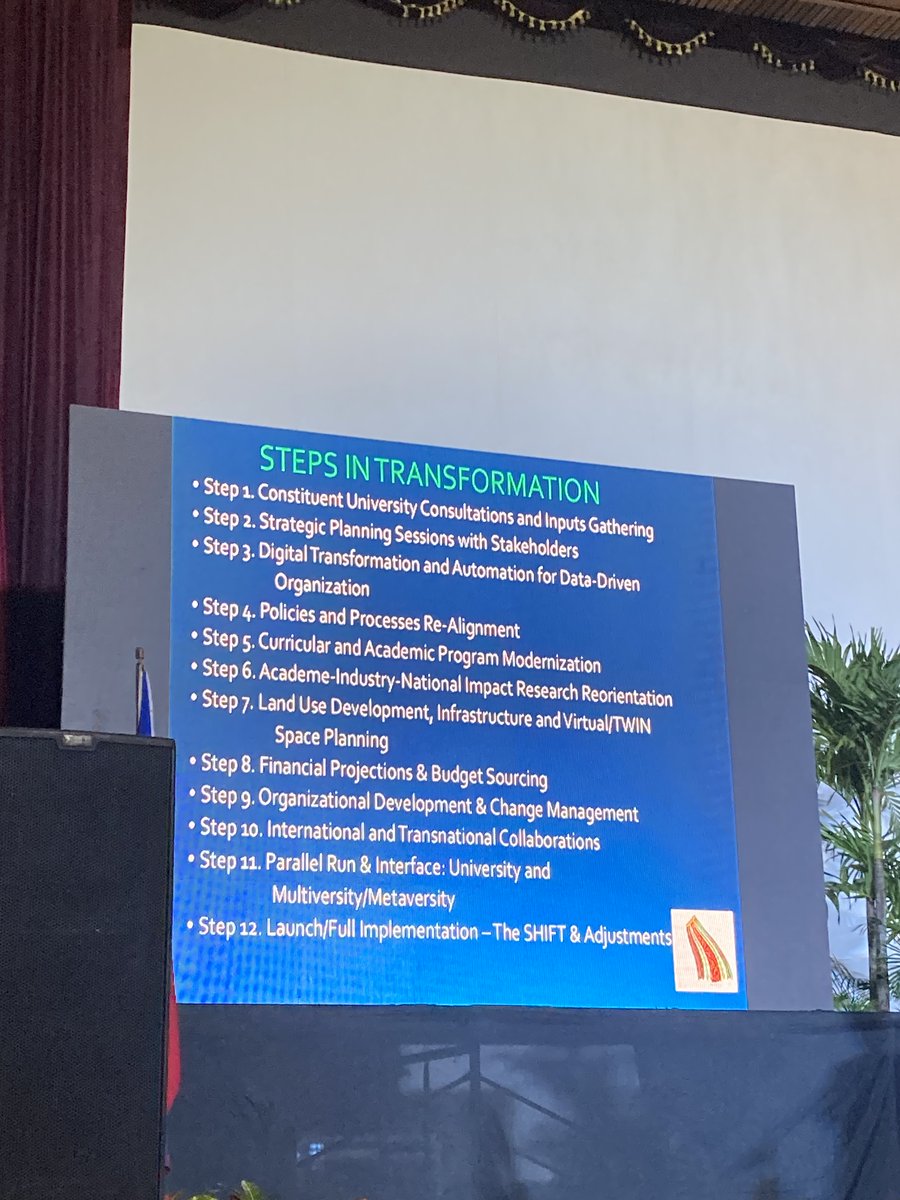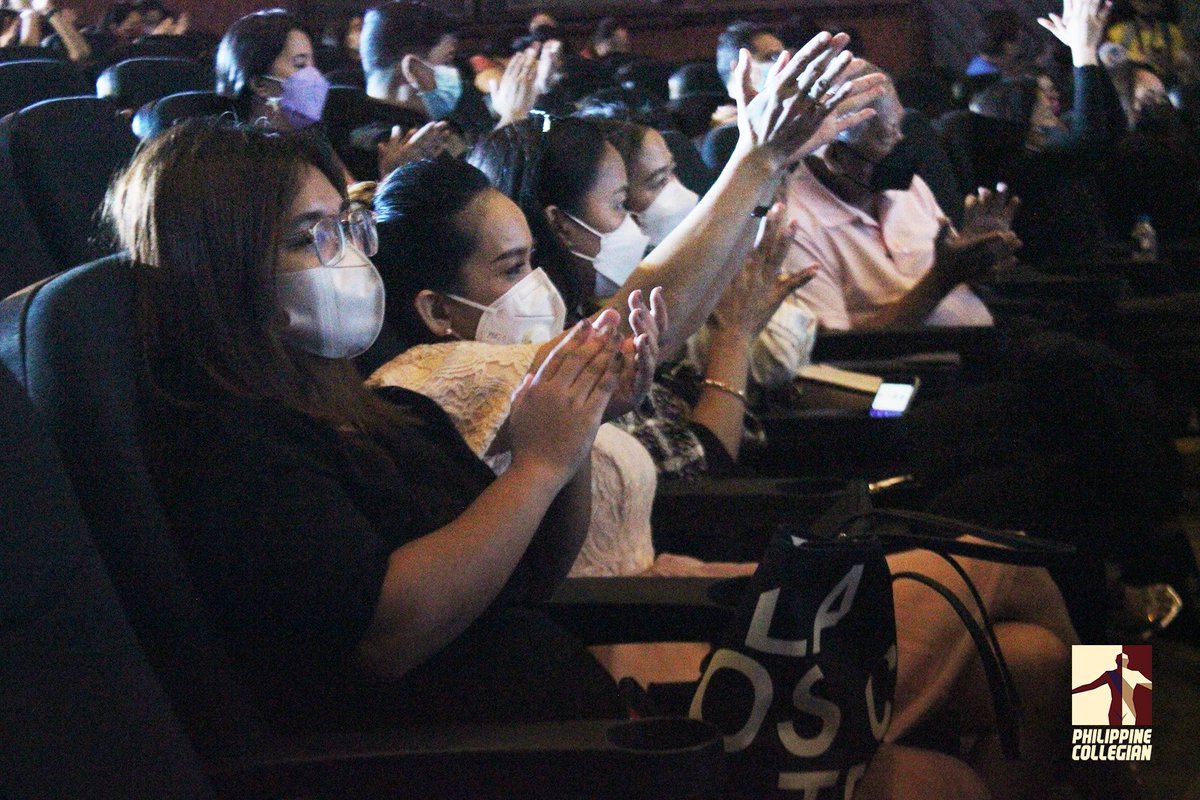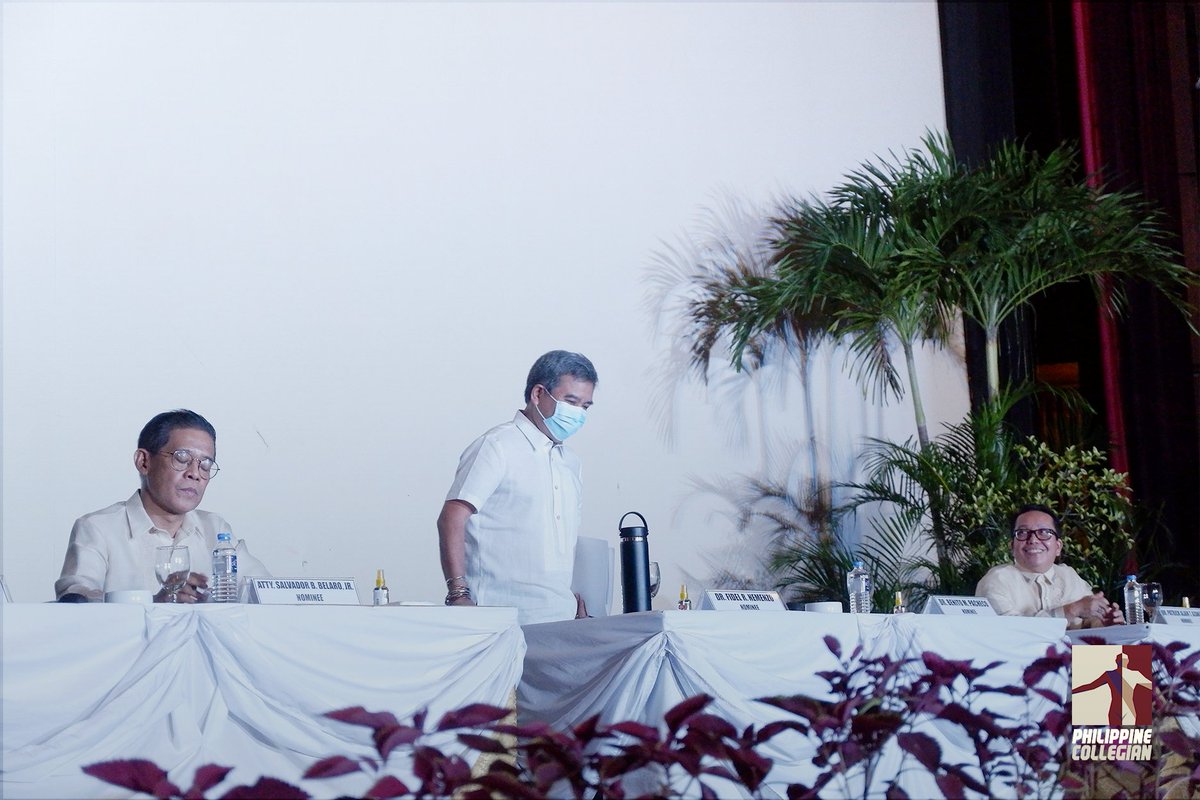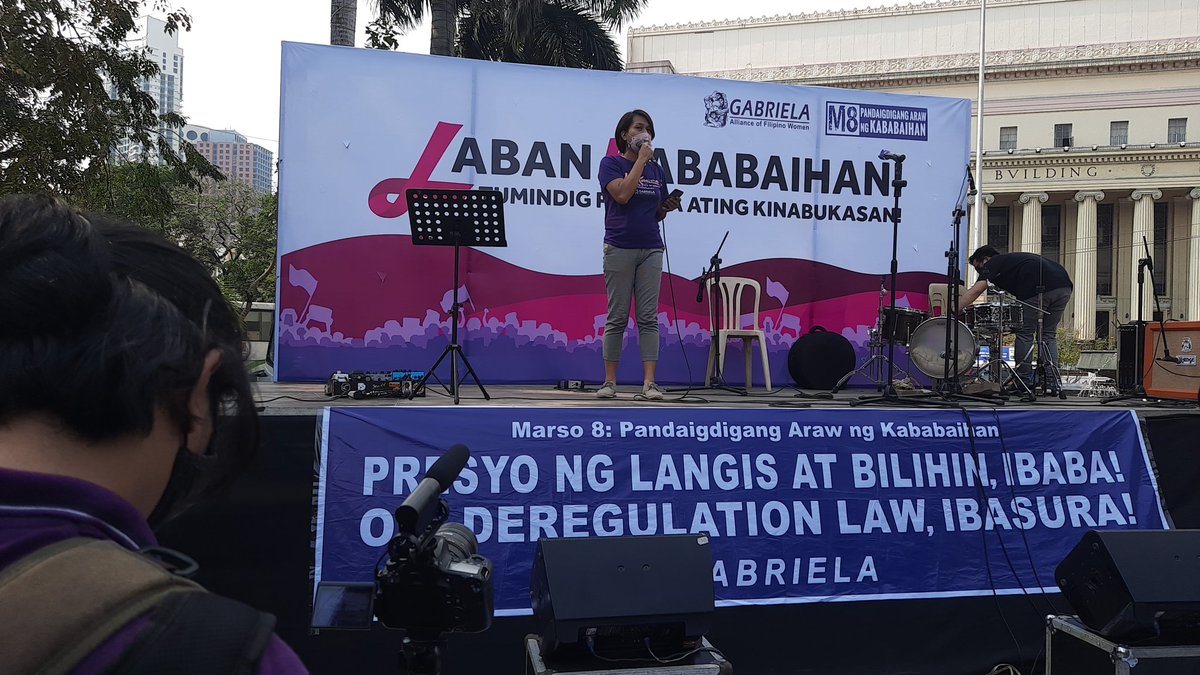
NOW: The search is on for the 22nd president of the University of the Philippines. The six nominees will face the UP constituency today in Cine Adarna, UP Diliman for the public forum. Today's event is also livestreamed on .
#UPPrexy
#UPPrexy

Got questions for the nominees? The Google Form for the questions is open until 5 p.m. today: bit.ly/UPPresQuestion. Unasked questions may be asked by the Board of Regents during their closed-door interview with the nominees.
#UPPrexy
#UPPrexy
Here are the mechanics of the forum: The six nominees will first draw lots to determine the order of presentation of their mission-vision statements. Each nominee will have 10 minutes. After all nominees have presented, a two-hour question and answer forum will proceed.
#UPPrexy
#UPPrexy
Here are the full mechanics of the forum, as released by the UP Board of Regents. Note that the 11 regents are collectively acting as the search committee for #UPPrexy.
https://twitter.com/phkule/status/1588498372406968321
CHED and UP Board of Regents Chair Prospero De Vera delivers remarks. He says the position of the UP president is unique because UP is the only national university. He adds that the president only serves for a single six-year term, hence errors cannot be rectified.
#UPPrexy
#UPPrexy
Here is the order of presentation:
1. Jimenez
2. Belaro
3. Nemenzo
4. Pacheco
5. Azanza
6. Sanchez
#UPPrexy
1. Jimenez
2. Belaro
3. Nemenzo
4. Pacheco
5. Azanza
6. Sanchez
#UPPrexy
Former regent and lawyer Angelo A. Jimenez begins his presentation. So far, his talk centers the future of education, post-pandemic. His vision is centered on the following: research power, digital transformation and democratic access.
#UPPrexy
Watch:
#UPPrexy
Watch:
Jimenez: We cannot afford to be nostalgic about the prepandemic era. We have to march forward with digital transformation, the personalizing power given by technology. It can create education at anytime and any place.
#UPPrexy
#UPPrexy
Jimenez continues his pitch for a digital and tech-driven UP. He even emphasizes that it may even be possible to use off-the-shelf technology to digitize UP processes and transactions--almost resembling former UP President Alfredo Pascual's controversial eUP project.
#UPPrexy
#UPPrexy
Ex-solon Salvador B. Belaro begins his talk. He says, if selected as #UPPrexy, he will commit to academic freedom, democratic access, and prioritize the interests of UP stakeholders. "We pride ourselves as the national university ... so we owe it to our stakeholders," he says.
Belaro chides UP's slow bureaucratic processes--an issue that has long affected UP workers, especially the contractuals. He says he will implement the Ease of Doing Business Act in UP to expedite transactions.
#UPPrexy
#UPPrexy
Belaro, a UP alumni himself, tries to deflect that he is an "outsider" nominee: My experiences outside UP taught me that others are more right than what we think. We should make an effort to look more outwardly.
#UPPrexy
#UPPrexy
UP Diliman Chancellor Fidel Nemenzo begins his presentation by admitting that his initial vision for UPD was interrupted by the pandemic. But despite that, he prides that his administration was still able to implement programs that were necessary to the UPD community.
#UPPrexy
#UPPrexy
In his defense, Nemenzo was just a week into his term as chancellor when UP Diliman was forced to close due to the COVID-19 pandemic. Now, he pitches his three-pronged vision for the entire UP System, if selected as president: smart, agile, and high-impact.
#UPPrexy
#UPPrexy
Civil Engineering Prof. Benito M. Pacheco is next. This is his second time to be nominated as UP president: Minsan, may nakaka-uno at summa cum laude pa sa take two.
#UPPrexy
#UPPrexy
In a pre-recorded talk, Pacheco blasts UP's seeming inability to select a more diverse and inclusive student mix. A large part of his mission-vision statement discusses his ideas to diversify admissions to UP.
#UPPrexy
#UPPrexy
Catanduanes State University President Patrick Alain T. Azanza is now presenting his vision paper entitled "Unibersidad ng Panghinaharap." He floats the idea of UP being a "multiversity," a concept that, he says, is based on the University of California System.
#UPPrexy
#UPPrexy
To become a multiversity, Azanza says, UP must highlight diversity, sense of purpose, happiness, and human greatness.
#UPPrexy
#UPPrexy
Azanza presents 12 steps in transforming UP, in accordance to his vision. The challenge for him, however, is to implement such a roadmap, given that a UP president is only given a single, six-year term to serve.
#UPPrexy
#UPPrexy

Last to present is ex-UP Los Baños Chancellor Fernando C. Sanchez Jr. He says UP must improve on its role of being a public service university and in taking care of its constituents. Sanchez, however, was noted for anti-student policies during his term as chancellor.
#UPPrexy
#UPPrexy
From @uplbperspective: From being a chancellor who pledged to assert students’ need to being pegged as a leader with an absentee administration, his two terms were marred with several controversies.
#UPPrexy
uplbperspective.org/2020/08/31/san…
#UPPrexy
uplbperspective.org/2020/08/31/san…
Sanchez pitches his plan to designate spaces where students can "hone their talents and express themselves." Yet his record speaks otherwise--as UPLB chancellor, he renovated the Student Union Bldg. w/o consultation, leading to the displacement of student institutions.
#UPPrexy
#UPPrexy
His vision centers on "synergy in diversity." It is a challenge for him, however, to convince his former constituents to support him. It must be noted that the UPLB community formed a broad alliance to oppose his 3rd term as chancellor, the No to Third Term Coalition.
#UPPrexy
#UPPrexy
Q for all nominees: Are you in favor of establishing commercial linkages to enhance research-based value creation in UP? How will this benefit UP units that are underperforming in value creation because its resources are exhausted in the service of the GE program?
#UPPrexy
#UPPrexy
Jimenez: I am in favor. We are aware of the mismatch of skills between the schools and the needs of the industry. The problem of public schools is that we tend to be too reliant on government subsidies. One of the key pillars of the UP is collaboration in research.
#UPPrexy
#UPPrexy
Belaro: These transactions should trickle down to the community and the less-privileged members of the community. The gains from these matters should be primarily devoted to the cultivation, enhancement, and protection of the entire UP system.
#UPPrexy
#UPPrexy
Nemenzo: Hindi lang commercial linkages pero lahat ng klaseng linkage. There should be a greater share for the budget of education. We need to know what projects need funding. Ang importante po ay good ideas–we translate these to good proposals
#UPPrexy
#UPPrexy
Pacheco: Dapat siguro nating ibahin ang pananaw, hindi totoo na walang value creation. Tayo ang magbibigay halaga at magbibigay identity. Hindi ito commercial interest. Value partnership ang pananaw doon at hindi commercial partnership.
#UPPrexy
#UPPrexy
Azanza: Dapat malinaw ang magiging benepisyo para sa faculty, students. Kailangan may social equity benefit ang ating mga kontrata. Kung sa’ting bawat sa transaction, may mapapaunlad at may share ang ating mga estudyante at guro.
#UPPrexy
#UPPrexy
Sanchez: I agree that research outputs that are matured have to be adopted by the private sector, primarily because these research have been funded by the FIlipino people. Kailangang mapakinabangan iyan ng FIlipino people sa targeted beneficiaries niya.
#UPPrexy
#UPPrexy
Q for all nominees: What are your plans to support and encourage growth in the humanities and social sciences in the university?
#UPPrexy
#UPPrexy
Azanza: Ang humanities at arts ay ang soul of human society. Sa aking envisioned, metaversity at multiversity, naka-anchor sa diversity sa edukasyon, talagag ine-emphasize ang pagkakaroon ng inputs, kasama ang humanities and arts.
#UPPrexy
#UPPrexy
Pacheco: Ang humanities, kahit hindi maging major, malamang minor, ay magiging mutually beneficial anuman ang pundasyon. So dapat ang humanities ay i-partner sa STEM. Kailangan natin ang humanities, whether major or minor.
#UPPrexy
#UPPrexy
Sanchez: I agree that the humanities, arts, and social science must be expended. Napaka-importante to humanize our scientists. Scientists could propose a proposal that could contribute to humanity in a better way.
#UPPrexy
#UPPrexy
Jimenez: All knowledge is just one body, they call it philosophy. What is happening right now is the integration of knowledge. You cannot have progress without culture. It is a way to save us from the machines.
#UPPrexy
#UPPrexy
Belaro: Ito po ay ating paiigtingin, pagyayamanin at poproteksyunan. In my mission and vision statement, I stated clearly the importance of having a livable community atmosphere in all colleges.
#UPPrexy
#UPPrexy
Nemenzo: Social sciences and humanities are important. I will provide more grants and incentives. We are developing the social sciences productivity system. We will establish more interdisciplinary centers that will allow artists to work together with our scientists.
#UPPrexy
#UPPrexy
Q for all: What are your plans for the institutionalization of the UPD PsycServ or the UPD psychosocial services?
#UPPrexy
#UPPrexy
Context: Students struggle with the deterioration of their mental health, especially during the virtual setup. Now more than ever, the call for PsycServ’s institutionalization is amplified.
#UPPrexy
phkule.org/article/600/up…
#UPPrexy
phkule.org/article/600/up…
Azanza: Napakahalaga na ang serbisyong ito ay ating i-implement systemwide at kapag ito ay ating nagawa, ang benepisyo sa komunidad ay mas malwak. Ang impact sa constituents ay mararamdaman, di lang sa Diliman.
#UPPrexy
#UPPrexy
Jimenez: Wellness is an important part of any education system, lalo na sa kabataan ngayon. There are certain negative things in digitization. They are not patient, they are psychologically weak, they fail at relationships. This is connected to emotional wellness.
#UPPrexy
#UPPrexy
Belaro: The way of the future is digitalization. If we were to be a university of the future that caters to the needs of people, that is the way to go. We should support and fund and give all it requires.
#UPPrexy
#UPPrexy
Nemenzo: The pandemic has magnified our fears and mental stress. Kasama ang PsycServ sa mga plano ko at ngayon inaaayos ang proposal para ma-institutionalize at maging regular office. I will institutionalize PsycServ and bring this to a broader framework.
#UPPrexy
#UPPrexy
Pacheco: Kailangan natin magamit ang magandang halimbawa ng PsycServ ng Diliman at ito ay ma-institutionalize sa iba’t ibang campuses. Kahit walang pandemic, affected ang cognitive aspect.
#UPPrexy
#UPPrexy
Sanchez: Addressing the mental health problem of stakeholders is important. Kaya we support the institutionalization of PsycServ. We support the improvement and enhancement.
#UPPrexy
#UPPrexy
Q for all: Paano ninyo masosolusyonan ang problema ng kawalan ng item, hindi lang sa faculty, kundi pati na rin sa mga admin at mga opisina?
#UPPrexy
#UPPrexy
Belaro says UP must lobby for additional items. Again, he stresses the Ease of Doing Business Act to implement his plan.
#UPPrexy
#UPPrexy
Pacheco says short-term plans may be implemented. He says UP may resort in hiring visiting faculty, for instance. He will, nonetheless, fight for additional items for the university.
#UPPrexy
#UPPrexy
Sanchez says he will first determine the number of additional items required. Then, he will submit proposals to Congress to grant UP additional items.
#UPPrexy
#UPPrexy
Jimenez says the lack of item is a symptom and not a cause. He says UP could instead focus in solutions within its control, like digitalization and the use of tech to ease the burden of work.
#UPPrexy
#UPPrexy
Nemenzo says UP should first fix its plantilla structure so the items match its responsibilities. Decent wages and social security benefits must be given to all UP workers.
#UPPrexy
#UPPrexy
Azanza says he was able to request additional items for Catanduanes State University. He plans to do the same to UP, should he be selected as the next UP president.
#UPPrexy
#UPPrexy
Nemenzo says benefits must be rationalized and prorated depending on the retiree's length of service. He says there must be a formula to determine the benefits to be fair for all.
#UPPrexy
#UPPrexy
Azanza: Mali ito at di dapat payagan. Dapat buhayin yung UP-DND Accord para maging maayos yung ating relasyon sa estado at protektado ang ating mga constituents sa campus.
#UPPrexy
#UPPrexy
Pacheco: Walang puwang ang red-tagging sa Pilipinas. Dapat ipagtanggol natin ang ating mamamayan sa lahat ng branding, laluna yung nakakaapekto sa kanilang well-being. #UPPrexy
Nemenzo: Red-tagging has no place in UP. Isa itong banta sa academic freedom. No to red-tagging and protect our universities as safe spaces for ideas.
#UPPrexy
#UPPrexy
Belaro: Lahat ng "ismo" ay pinag-aaralan natin. Dapat paigtingin natin ang ating academic freedom, dahil dito lang magfu-flourish ang critical thinking.
#UPPrexy
#UPPrexy
Jimenez: We cannot assure anyone because the battle is the public sphere. We have to fight back with a strong public diplomacy. We must explain, and we have to strengthen that. Wag natin silang tawaging "tards," "bobo" o "hindi pumasa ng UP." We have sworn to serve them.
#UPPrexy
#UPPrexy
Q for all: How can you ensure equality among the constituent units (e.g. budget, items, and projects)?
#UPPrexy
#UPPrexy
Nemenzo says he first need to understand the strengths and constraints of all CUs. He says he is for a more equitable and rational distribution of resources.
#UPPrexy
#UPPrexy
Belaro says UP must provide equity as strict equality cannot be provided to all constituent unit.
#UPPrexy
#UPPrexy
Sanchez he will ask every UP unit's needs. From that, the UP System can determine the equitable distribution of resources, based on prioritization.
#UPPrexy
#UPPrexy
Azanza says CUs must define their priorities and the corresponding requirements. He says predictive analytics will determine the CU's needs.
#UPPrexy
#UPPrexy
Pacheco says the entire UP System must discuss first their shared vision, comparing the UP System to a family with eight children.
#UPPrexy
#UPPrexy
Q for all: How do you intend to help the faculty produce research output given their high teaching load?
#UPPrexy
#UPPrexy
Sanchez: High teaching load corresponds to harder process of doing research. We must lower teaching load--and to lower their load, we must increase the number of items. We need to bring in more faculty items to increase research load.
#UPPrexy
#UPPrexy
Pacheco: Ang research sana ay institutional para di lang isang tao ang pumapasan nito. Kung institutional ang commitment, mas may tsansa tayong mag-share ng load. Pwede rin tayong mag-open para sa mga part-time affiliates. Limitado rin tayo dahil sa procurement.
#UPPrexy
#UPPrexy
Nemenzo: More funds, more grants, more incentives for research. I will also like to explore the option of hiring more teaching assistants to reduce faculty teaching load. We can also implement two tracks for faculty: teaching track and research track.
#UPPrexy
#UPPrexy
Jimenez: I will push for a strategic research agenda. Once we have that, we can easily sell it to our partners. But it's all about money in the end.
#UPPrexy
#UPPrexy
Belaro: We must increase funding and incentives to promote a research culture. There must also be linkages b/w academe & private sector. Magtatalaga ako ng komite na pagtutuunan ng pansin ang research management.
#UPPrexy
#UPPrexy
Azanza: Mahalaga ang research sa metaversity. Ang transition sa application ng AR at AI ay kinakailangan lalo na sa paghubog ng mga kurikulum na ating kailangan.Kapag lumawak ito, mabibigyan ng emphasis ang ating research agenda, research culture.
#UPPrexy
#UPPrexy
Q for all: What are your plans for the health insurance coverage of the faculty and staff, and their immediate family members, aside from Philhealth and eHOPE?
#UPPrexy
#UPPrexy
Jimenez: I have not thought of a detailed plan aside from PhilHealth and eHope. #UPPrexy
Belaro: Akin pong itutulak ang libreng serbisyong medikal para sa UP constituents. #UPPrexy
Nemenzo: Sa ating pamantasan, mayroon tayong expertise para makapag-develop ng mahusay na health insurance scheme. It’s about time that we do it. #UPPrexy
Pacheco: Gawing mas epektibo ang e-Hope at PhilHealth. Dagdagan natin ng additional insurance ang ating employees. #UPPrexy
Azanza: Gagawin ko ang ginawa ko sa Catanduanes State University. Lahat ng estudyante at empleyado ay covered ng insurance. #UPPrexy
Sanchez: I will improve the health insurance by creating a systemwide committee to review its increase. #UPPrexy
Q for Jimenez, Nemenzo, and Sanchez – Ano ang plans ninyo sa assets (lands) na pag-aari ng UP?
Jimenez: We have yet to establish a plan for the lands. There are so many ways of maximizing our assets and lands not just to set up economic zones but the kind that will bring in certain activities that will fit us. #UPPrexy
Nemenzo: The utilization of lands should be in accordance with our own values, priorities as a university. Ang mga hindi ginagamit na lupa ay hubs of diversity that must be preserved. #UPPrexy
Sanchez: Kailangan lahat ng land assets ay titled to UP. We now plan how to utilize them—either for commercial or research. #UPPrexy
Pacheco: Nandoon ang opportunity to use the lands in the future para sa ibang paraan pero kailangan protektahan muna ang academic core zones. #UPPrexy
Azanza: Sa CatSU, in-allocate natin ang 30% para sa economic zone. I have the expertise to make sure this is also done in UP. #UPPrexy
Belaro: Dapat magkaroon ng imbentaryo ng lahat ng assets at lupa ng unibersidad at i-target ang best use for the land. #UPPrexy
Q for Jimenez – What is your advantage over the other candidates in terms of pursuing the vision to make UP a global university? #UPPrexy
Jimenez: I am just as good or as bad as the other candidates. But I spent a decade serving the country in so many parts of the world protecting workers’ rights. #UPPrexy
Q for Sanchez – How would you explain the strict and anti-student protocols of UPLB SU and 600 pending and declined MRR under your term? #UPPrexy
Sanchez: We were implementing a curfew in UPLB because of security concerns because there were rape cases. This was done to protect the safety of students, not to curtail the rights of the students. #UPPrexy
Sanchez: Regarding the MRR, we are just implementing the University Code that was specifically formulated by the Board. #UPPrexy
Q for All – Ano ang tindig ninyo sa PUV modernization program? Ano ang implikasyon nito sa UP? #UPPrexy
Jimenez: We have to invest in mass transit but there must be proper financing that they can afford. It must be humane and realistic. #UPPrexy
Nemenzo: I am in favor of modernization but the government must provide support to ensure a just transition for our drivers and our public sector. #UPPrexy
Azanza: Hindi pwedeng kapag may maisip ka, hingin mo agad sa gobyerno. Maraming private entities na wiling to finance through a favorable arrangement with transport groups. #UPPrexy
Belaro: Kung mayroon na talagang mga modern vehicles consistent with standards, go for it. But, practicability should rule the day. It should not disrupt the daily activities of our constituents. #UPPrexy
Pacheco: Modern is not a bad word. Personally, iyong kooperatiba o financial access ay isang paraan para matugunan ang isyu ng mga driver. #UPPrexy
Sanchez: We need to ensure smooth transition. The government should help in financing this modern jeepney. #UPPrexy
Q for All - How will you approach the proliferation of ‘informal settlers’ among most CUs? #UPPrexy
Sanchez: We need to improve their welfare inside the campus. We need to help them on how they would improve their way of life by providing them with the necessary space in campus. #UPPrexy
Azanza: Ang mga informal settlers ay bahagi ng UP community na di pwedeng alisin at tratuhin na parang hindi bahagi ng komunidad. Pwede silang i-cluster sa isang area kung saan ang kanilang paghahanapbuhay ay maayos. #UPPrexy
Pacheco: Tao sila kaya hindi pwedeng sabihin na lupa ito ng UP at bawal sila. Kailangan natin mapabuti ang kanilang kalagayan. #UPPrexy
Nemenzo: We need to develop a compassionate policy towards informal settlers. We need to work with local governments in finding relocation sites where they have access to decent work. #UPPrexy
Jimenez: I cannot reconcile informal settlers in academic spaces. There are other spaces where you have to recognize the law. Kailangang manindigan tayo kasi binigay yan sa UP for maximizing education. #UPPrexy
Q for All: What can you say about the slide in UP’s global rankings? #UPPrexy
Jimenez: Bumaba tayo in almost all metrics. We have to understand that this is an unusual time because of the pandemic. I don't mind going up and down, what's important is we have a goal. #UPPrexy
Belaro: Metrics management is very important in this globalizing world of academia. If elected, I will set-up a committee for this. #UPPrexy
Nemenzo: We need to critically examine the metrics of rankings. We are doing our best that isn't always captured in the ranking. We should never lose sight of our real objective. #UPPrexy
Pacheco: We focus on the mandate of UP as a national university and we learn wiser to be in the radar of the global rankings. #UPPrexy
Azanza: Ang rankings ay wake-up call sa akin. Itong rankings ay implikasyon lamang ng kung anong dapat natin pagigtingin para makasundo tayo at maka-igpaw sa present situation. #UPPrexy
Sanchez: We should not ignore the rankings because these are symptoms of how our university is faring with other universities. #UPPrexy
Q for All - Ano ang edge mo bilang kandidato para maging susunod na UP president? #UPPrexy
Sanchez: I’m a two-term chancellor of UPLB. I have experienced the ins and outs of administrative work. #UPPrexy
Azanza: Dati akong UP Student Council Chairman, naging admin at research staff, naging faculty, nnang naging HRD Director ako. Ako ang nag-convert sa AMA University from a College. #UPPrexy
Pacheco: Isa akong common faculty at village dweller. Doon manggagaling ang puso na dadalhin natin sa presidency. #UPPrexy
Nemenzo: I have an intimate understanding of the culture and complexities of the university. I have visited the CUs, coordinated with other chancellors, been exposed overseas. It has given me new perspectives about our university. #UPPrexy
Belaro: My advantage is that my vast experience internationally and locally is the leadership that could stir UP. #UPPrexy
Jimenez: I have more global experience. I have more experience looking at systems. I have been trained as a crisis manager and to analyze the most important factors of success. #UPPrexy
Outgoing UP President Danilo Concepcion says in their closing remarks that we must look for someone that could walk the talk and someone who can make things happen fast and responsive. #UPPrexy
LOOK: The #UPPrexy forum ends with a lightning rally organized by student-leaders. #DefendUP
Leaders from the UP studentry and urban poor community demand concrete plans of action from UP president nominees.
Read the UP student agenda here: bit.ly/UPStudentAgend.
Leaders from the UP studentry and urban poor community demand concrete plans of action from UP president nominees.
Read the UP student agenda here: bit.ly/UPStudentAgend.
• • •
Missing some Tweet in this thread? You can try to
force a refresh


























